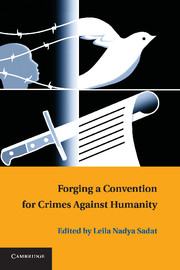Book contents
- Frontmatter
- Contents
- Figures and Maps
- Crimes Against Humanity Initiative: Steering Committee
- Biographies of Contributors
- Foreword
- Preface and Acknowledgments
- Crimes Against Humanity and the Responsibility to Protect
- 1 History of Efforts to Codify Crimes Against Humanity
- 2 The Universal Repression of Crimes Against Humanity before National Jurisdictions
- 3 Revisiting the Architecture of Crimes Against Humanity
- 4 The Bright Red Thread
- 5 Gender-Based Crimes Against Humanity
- 6 “Chapeau Elements” of Crimes Against Humanity in the Jurisprudence of the UN Ad Hoc Tribunals
- 7 The Definition of Crimes Against Humanity and the Question of a “Policy” Element
- 8 Ethnic Cleansing as Euphemism, Metaphor, Criminology, and Law
- 9 Immunities and Amnesties
- 10 Modes of Participation
- 11 Terrorism and Crimes Against Humanity
- 12 Crimes Against Humanity and the International Criminal Court
- 13 Crimes Against Humanity and the Responsibility to Protect
- 14 Re-enforcing Enforcement in a Specialized Convention on Crimes Against Humanity
- 15 Why the World Needs an International Convention on Crimes Against Humanity
- Appendices
- Testimonials and Endorsements
- Index
Preface and Acknowledgments
Published online by Cambridge University Press: 01 June 2011
- Frontmatter
- Contents
- Figures and Maps
- Crimes Against Humanity Initiative: Steering Committee
- Biographies of Contributors
- Foreword
- Preface and Acknowledgments
- Crimes Against Humanity and the Responsibility to Protect
- 1 History of Efforts to Codify Crimes Against Humanity
- 2 The Universal Repression of Crimes Against Humanity before National Jurisdictions
- 3 Revisiting the Architecture of Crimes Against Humanity
- 4 The Bright Red Thread
- 5 Gender-Based Crimes Against Humanity
- 6 “Chapeau Elements” of Crimes Against Humanity in the Jurisprudence of the UN Ad Hoc Tribunals
- 7 The Definition of Crimes Against Humanity and the Question of a “Policy” Element
- 8 Ethnic Cleansing as Euphemism, Metaphor, Criminology, and Law
- 9 Immunities and Amnesties
- 10 Modes of Participation
- 11 Terrorism and Crimes Against Humanity
- 12 Crimes Against Humanity and the International Criminal Court
- 13 Crimes Against Humanity and the Responsibility to Protect
- 14 Re-enforcing Enforcement in a Specialized Convention on Crimes Against Humanity
- 15 Why the World Needs an International Convention on Crimes Against Humanity
- Appendices
- Testimonials and Endorsements
- Index
Summary
This book represents the culmination of more than one hundred years of effort in the development of international criminal law. With extraordinary support and input from nearly 250 noted experts from around the world, a complete Proposed International Convention on the Prevention and Punishment of Crimes Against Humanity has finally been elaborated. It is my sincere hope that the Proposed Convention, along with the collected scholarly articles and drafting history set forth herein, will serve as a foundation for the consideration – and ultimate adoption by States – of a crimes against humanity convention, a still-missing and essential piece of the framework of international humanitarian and international criminal law.
During the trials of the German and Japanese leaders by the Allies following World War II, crimes against humanity emerged as an independent basis of individual criminal liability in international law. Although the so-called Martens Clause of the 1907 Hague Convention Respecting the Laws and Customs of War on Land referenced the “laws of humanity, and … the dictates of the public conscience” as protections available under the law of nations to human beings caught in the ravages of war, this language was too uncertain to provide a clear basis for either State responsibility or criminal liability under international law. Subsequently, crimes against humanity were specifically included in the Charters of the International Military Tribunals at Nuremberg and Tokyo to address depredations directed against civilian populations by the State – including the State of the victims' nationality.
- Type
- Chapter
- Information
- Forging a Convention for Crimes against Humanity , pp. xix - xxviiiPublisher: Cambridge University PressPrint publication year: 2011



